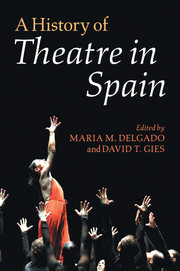Book contents
- Frontmatter
- Contents
- Illustrations
- Contributors
- Acknowledgements
- Introduction
- 1 The challenges of historiography
- 2 Lope de Vega, Calderón de la Barca and Tirso de Molina
- 3 The world as a stage
- 4 Playing the palace
- 5 The art of the actor, 1565–1833
- 6 Theatrical infrastructures, dramatic production and performance, 1700–1759
- 7 Popular theatre and the Spanish stage, 1737–1798
- 8 Theatre of the elites, neoclassicism and the Enlightenment, 1750–1808
- 9 Actors and agency in the modern era, 1801–2010
- 10 Zarzuela
- 11 Nineteenth-century Spanish theatre
- 12 Copyright, buildings, spaces and the nineteenth-century stage
- 13 Modernism and the avant-garde in fin-de-siècle Barcelona and Madrid
- 14 Continuity and innovation in Spanish theatre, 1900–1936
- 15 Theatrical activities during the Spanish Civil War, 1936–1939
- 16 Theatre, colonialism, exile and the Americas
- 17 Theatre under Franco (1939–1975)
- 18 Flamenco
- 19 Nationalism, identity and the theatre across the Spanish state in the democratic era, 1975–2010
- 20 Directors and the Spanish stage, 1823–2010
- 21 This evolution is still ongoing
- 22 Theatre as a process of discovery
- 23 Theatre is the art of the future
- Select bibliography
- Index
- References
19 - Nationalism, identity and the theatre across the Spanish state in the democratic era, 1975–2010
Published online by Cambridge University Press: 05 June 2012
- Frontmatter
- Contents
- Illustrations
- Contributors
- Acknowledgements
- Introduction
- 1 The challenges of historiography
- 2 Lope de Vega, Calderón de la Barca and Tirso de Molina
- 3 The world as a stage
- 4 Playing the palace
- 5 The art of the actor, 1565–1833
- 6 Theatrical infrastructures, dramatic production and performance, 1700–1759
- 7 Popular theatre and the Spanish stage, 1737–1798
- 8 Theatre of the elites, neoclassicism and the Enlightenment, 1750–1808
- 9 Actors and agency in the modern era, 1801–2010
- 10 Zarzuela
- 11 Nineteenth-century Spanish theatre
- 12 Copyright, buildings, spaces and the nineteenth-century stage
- 13 Modernism and the avant-garde in fin-de-siècle Barcelona and Madrid
- 14 Continuity and innovation in Spanish theatre, 1900–1936
- 15 Theatrical activities during the Spanish Civil War, 1936–1939
- 16 Theatre, colonialism, exile and the Americas
- 17 Theatre under Franco (1939–1975)
- 18 Flamenco
- 19 Nationalism, identity and the theatre across the Spanish state in the democratic era, 1975–2010
- 20 Directors and the Spanish stage, 1823–2010
- 21 This evolution is still ongoing
- 22 Theatre as a process of discovery
- 23 Theatre is the art of the future
- Select bibliography
- Index
- References
Summary
The idea of a national theatre in its modern incarnation emerged during the eighteenth century, coinciding with the political and social turmoil of the French Revolution. Its intellectual and aesthetic origins thus can be traced to concerns with individual expression and national identity that came to light in relation to European Romanticism. Since that time, a myriad of public institutions, some of them quite massive and others more diminutive, have surfaced on the European theatrical landscape in accordance with the post-Enlightenment concept of a national theatre. They are designed to encourage a national consciousness, as well as create, promote and safeguard a national repertoire. Curiously, these institutions have often predated the establishment of the nation-states whose interests they would come to represent. The disintegration of empires, the ensuing creation of nation-states (and, in some cases, their postcolonial deconstruction or collapse), the spread of cosmopolitanism and migratory and exilic movements all influenced the evolution of the national theatre. For Loren Kruger, consequently, the idea of a national stage, in its modern sense, exists within an inherently ‘transnational field’, in which varying claims to the authority and legitimacy of languages, cultures, locations, borders and audiences have all played a role in its conception.
The political-cultural climate of Spain during the post-Franco transition to democracy was characterised, in a parallel manner, by a situation of competing assertions and assumptions with regard to self-determination, national identity and cultural legitimacy. Censorship, which lingered beyond the death of Franco in 1975, ended officially in 1977. The contemporary configuration of Spain, implemented with the Constitution of 1978, as a nation-state composed of seventeen autonomous communities, has given renewed impetus to deep-seated historical claims concerning cultural and linguistic identities in areas such as the Basque Country, the Catalan-speaking lands and Galicia. Spain's entry into the European Union in 1986 emboldened political groups inclined to question the sovereignty of the Spanish state by encouraging either a plurinational arrangement or even independence. The concept of a national theatre as it emerged within post-Franco Spain was, accordingly, decidedly transnational.
- Type
- Chapter
- Information
- A History of Theatre in Spain , pp. 391 - 425Publisher: Cambridge University PressPrint publication year: 2012



